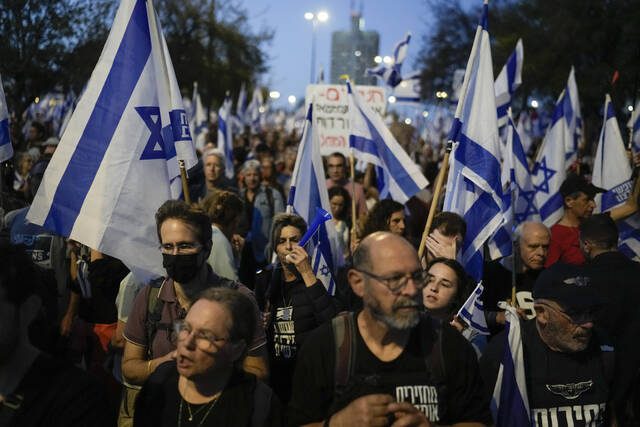DEIR AL-BALAH, Gaza Strip — The Israeli military left Gaza's biggest hospital early Monday after a two-week operation, during which it claimed to have killed about 200 fighters and detained hundreds more. Local residents said the troops left some bodies and a lot of damage behind.
The military has called the operation at Shifa Hospital one of its most successful during the six-month war. However, this happened as frustration in Israel was growing. Tens of thousands protested against Prime Minister Benjamin Netanyahu on Sunday, demanding more effort to free hostages in Gaza. It was the largest anti-government protest since the beginning of the war.
The combat highlighted Hamas' ability to resist even in one of the hardest-hit areas. Israel had previously said it had mostly defeated Hamas in northern Gaza and withdrew thousands of troops, leaving a security gap that made providing much-needed aid difficult.
The military reported that senior Hamas members and other fighters who had regrouped there after a previous raid in November were among those killed. They also said they confiscated weapons and valuable information.
The U.N. health agency stated that more than 20 patients died and many were put in danger during the operation, further damaging a hospital that was already barely functioning.
Israel has accused Hamas of using hospitals for military purposes and has raided several medical facilities. Gaza health officials deny these accusations. Critics say the army endangered civilians and badly damaged a health sector already struggling with war casualties. Palestinians claim Israeli troops forcibly removed residents from homes near Shifa in downtown Gaza City and made hundreds of residents march south.
Rear Adm. Daniel Hagari, the top military spokesman, said that Hamas and the smaller Islamic Jihad group had set up their main base in the hospital's northern section. He described days of close-quarters combat and blamed Hamas for the destruction, saying some fighters barricaded themselves in hospital wards while others fired mortar rounds at the compound.
He stated that about 900 suspected militants, including more than 500 Hamas and Islamic Jihad fighters, were arrested during the operation. The military also seized over $3 million in various currencies, as well as weapons.
He denied that Israeli forces had harmed any civilians, claiming the army evacuated more than 200 of the estimated 300 to 350 patients and provided food, water, and medical supplies to the rest. Two Israeli soldiers and about 200 militants were reported killed in the operation.
Mohammed Mahdi, who was among hundreds of Palestinians who returned to the area, described the situation as “complete destruction.” He mentioned several buildings being burnt down and six bodies, including two in the hospital courtyard.
Video footage shared online showed severely damaged and burnt buildings, heaps of dirt churned up by bulldozers, and patients on stretchers in darkened hallways.
Another person living there, Yahia Abu Auf, said army bulldozers had even plowed up a makeshift cemetery in Shifa’s courtyard.
“The situation here is impossible to describe,” he said. “The occupation destroyed all sense of life here.”
At least 21 patients have died since the raid began, World Health Organization Director-General Tedros Adhanom Ghebreyesus posted late Sunday on X, previously known as Twitter.
He said over a hundred patients were still inside the compound, including four children and 28 critical patients. He also said there were no diapers, urine bags or water to clean wounds, and that many patients suffered from infected wounds and dehydration.
The military had previously raided Shifa in November, after saying Hamas maintained an elaborate command and control center inside and beneath the compound. It revealed a tunnel running beneath the hospital that led to a few rooms, as well as weapons it said it had confiscated from inside medical buildings, but nothing on the scale of what it had alleged prior to that raid.
The conflict started on Oct. 7, when Hamas-led militants stormed into southern Israel, killing some 1,200 people, mostly civilians, and taking around 250 people hostage.
Israel responded with an air, land and sea offensive that has killed at least 32,782 Palestinians, according to Gaza’s Health Ministry. The ministry does not distinguish between civilians and combatants in its count but says women and children have made up around two-thirds of those killed.
The Israeli military says it has killed over 13,000 Hamas fighters, without providing evidence, and blames the civilian death toll on Palestinian militants because they fight in dense residential areas.
The conflict has displaced most of the territory’s population and driven a third of its residents to the brink of famine. Northern Gaza, where Shifa is located, has suffered vast destruction and has been largely isolated since October, leading to widespread hunger.
Even as Israel has turned its focus to other parts of Gaza this year, its troops have battled militants in the north on a number of occasions, and the two weeks of heavy fighting around Shifa highlighted the staying power of the armed groups.
Netanyahu has promised to continue the attack until Hamas is destroyed and all of the hostages are freed. He says Israel will soon expand ground operations to the southern city of Rafah, where some 1.4 million people — more than half of Gaza’s population — have sought refuge.
But he faces increasing pressure from Israelis who blame him for the security failures of Oct. 7 and from some families of the hostages who blame him for the failure to reach a deal despite several weeks of talks mediated by the United States, Qatar and Egypt. Allied countries, including main backer the United States, have warned him against an invasion of Rafah.
Hamas and other militants are still believed to be holding some 100 hostages and the remains of 30 others, after freeing most of the rest during a cease-fire last November in exchange for the release of Palestinians imprisoned by Israel.



